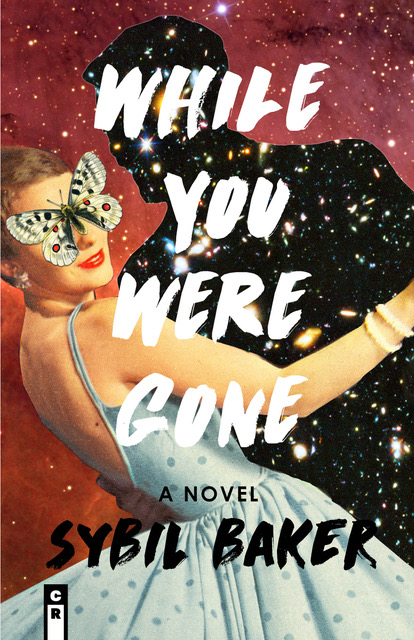
(C&R Press, 2018)
REVIEW BY BARTON SMOCK
—
What if not so strange bedfellows were soap opera and short story? What if promise is a shape that steals the form of its maker? What if keyhole was the eye of an empty clock? What if one could look long enough at the ceiling and so change the color of heaven? If each, then I would say we may one day have a book like Sybil Baker’s While You Were Gone. In the meantime, we have Sybil Baker’s While You Were Gone.
In different stages of gone-ness are three sisters from Tennessee. Are Claire, Shannon, and Paige. In that order, or not. Each goes from sadness to updated sadness, knowing place as puzzle but seeing differently how a piece can be both missing and extra. As Baker draws them, they are lived-in and in orbit; spirits in a movie about feet touching the earth. Claire, sheltered so early by her belief in free fall; Shannon, silenced by her idealization of reportage; Paige, seeker of a recordable transit. Insomniac acolytes, all. Survivors of synopsis anchored to haunting their individual uprootings. The South is here: the new, the old, the same, the simultaneous. As is the short attention span of history. As is the subtle and futureless yen a body has for ruin. As is Death, a fourth sister, whose blood has no birthday.
Fathers read of sickness and outside some are singing and this is the church of the unmothered internal. Mind is the dream of memory. Sex claws at the present. Some here are egg-shaped and hiding and asking, sister, can the devoured hear the sound that my stomach is making? I have no answers. There are Fisher Price figures in a crochet dollhouse. I said oh, above this work, and oh again. For I had not guessed doom to be impulsive. For I had not known endings to revive arrival, or grief to put brush before fossil.
As a storyteller, Baker knows revelation is the consoler of plot and that time exists to mourn chronology. As an artist, Baker casts a bite-mark on that vividly tragic fruit as one awed into suddenness and then as three in the twilight of playing dress-up. As a voice, Baker quotes shadows beyond the reach of comment.
I pray you will love this book for its commemorative absences and for its overlapping obscurities. I believe you will for how it navigates so visibly that it trades being spotted for being seen.
—
Barton Smock lives in Columbus, Ohio, with his wife and four children. He is the author of the chapbook infant*cinema (Dink Press, 2016) and editor of isacoustic* (isacoustic.com)
![[PANK]](https://pankmagazine.com/wp-content/themes/pank/assets/images/pank-logo-large.png)
